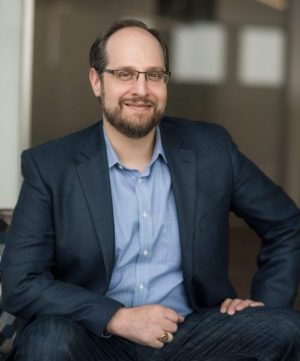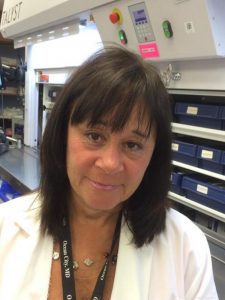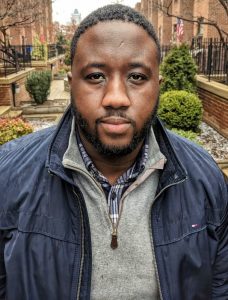
5 Questions with Aaron Vernon, VP of Engineering & Supply Chain, Autolus
“5 Questions With……” is a weekly BioBuzz series where we reach out to interesting people in the BioHealth Capital Region to share a little about themselves, their work, and maybe something completely unrelated. We’re excited to chat with Aaron Vernon of Autolus.
Aaron is a passionate builder with over 20 years of experience in supply chain management, manufacturing, business process development, organizational transformation, and facility design/construction at Johnson & Johnson, MedImmune, AstraZeneca, Sucampo, and Autolus. He is currently Vice President of Engineering & Supply Chain at Autolus, Inc, where he and his team are responsible for building and orchestrating Autolus’ global supply network. He lives in Dayton, Maryland with his wife, 3 children, and his dog.
1. What was your first job/role in biotech?
I started working for Johnson & Johnson right out of college, working as Packaging Equipment engineer building custom bottle-handling and filling equipment for products like Johnson’s Baby Shampoo. After a couple of years, I was moved to working on equipment for making pantiliners. After a comical plant visit that culminated in four male engineers performing adhesive tests on their trousers legs, I decided that Consumer Products wasn’t the industry for me anymore. Luckily, I was able to find a role as a Project Engineer within J&J on the biotech side of the business shortly thereafter. My first project was building custom roller bottle handling and filling equipment for manufacturing erythropoietin at their plant in Puerto Rico.
2. What can you tell us about your current role and company?
I’m currently the VP of Engineering & Supply Chain at Autolus. Autolus is a clinical-stage company headquartered in London, but with US offices in Rockville, focused on development of autologous CAR T cell therapies for treatment of cancer. We were founded approximately 6 years ago on technology pioneers by our chief scientific officer, Martin Pulé, which was spun out from University College of London. My team is responsible for building and orchestrating Autolus’ global supply network, including Planning, Sourcing, Logistics, Business Systems, Global Engineering & Facilities, and EHS. Though our current manufacturing is located in the UK, we are building our first commercial scale manufacturing facility in collaboration with Alexandria Real Estate Partners (ARE) in Rockville on Medical Center Drive. That facility has a planned capacity of 5,000 patients per annum and will allow us to add local jobs as well.
3. What is the biggest misconception in this industry when it comes to “Supply Chain” and why?
Misconception? Most of the time people don’t think about supply chain in their daily lives until they can’t get toilet paper, so it’s hard to assess. However, I’d say that people seem to equate supply chain with simply shipping things. You can’t imagine how many resumes I received from people whose expertise is shipping mattresses while recruiting for my Global Head of Logistics role. Though logistics is an important part of our work (especially as our supply chains are circular), it’s the orchestration of all the activities from plan-source-make-deliver that is the key to ours and every supply chain. These therapies are make-to-order and the patients are fragile, so the cycle time from when they’re leukapheresed to when they’re dosed needs to be measured in days or weeks, not months. All our work thus needs to be synchronized to allow us to deliver for our patients on time, every time.
4. Tell us something about your job (other than money) that inspires you to work there.
This is simple – I want to make products that save lives. I’ve been fortunate in my career to work on drugs for anemia, rheumatoid arthritis, severe asthma, and respiratory syncytial virus, but the products closest to my heart are the oncology drugs. Like many people, my life has been impacted by cancer. My father, mother, and nephew are all cancer survivors, and I work every day to give every patient the opportunity to live as long a life as possible.
5. If you woke up and had 1,000 unread emails and could only answer 250 of them, how would you choose which ones to answer?
First things first, I’d hope that most of those emails are just people “replying all” to a single message. I’d likely sort through them by sender and focus first on those from my staff, my boss, and my closest colleagues. When I’m overrun with emails (which happens more often than I’d like to admit), I’ll run through emails in that way and sort those that need attention versus those that are replies or simply CC’s. Once that first sort is done, I can focus on the emails that are truly pressing issues. But my team and colleagues know that if you want to get me, text or IM me. Nowadays, email is a last resort.
Thanks to Aaron Vernon for participating in the ‘5 Questions with BioBuzz’ series and stay tuned for more interviews with others from across the BioHealth Capital Region.




